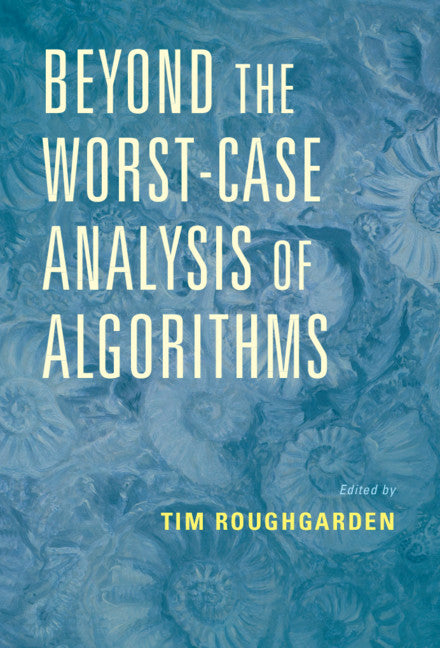Freshly Printed - allow 8 days lead
Couldn't load pickup availability
Beyond the Worst-Case Analysis of Algorithms
Introduces exciting new methods for assessing algorithms for problems ranging from clustering to linear programming to neural networks.
Tim Roughgarden (Edited by)
9781108494311, Cambridge University Press
Hardback, published 14 January 2021
704 pages
26 x 18.8 x 4 cm, 1.4 kg
'The book is a must have for any aspiring algorithm researcher … Essential.' D. Papamichail, Choice Magazine
There are no silver bullets in algorithm design, and no single algorithmic idea is powerful and flexible enough to solve every computational problem. Nor are there silver bullets in algorithm analysis, as the most enlightening method for analyzing an algorithm often depends on the problem and the application. However, typical algorithms courses rely almost entirely on a single analysis framework, that of worst-case analysis, wherein an algorithm is assessed by its worst performance on any input of a given size. The purpose of this book is to popularize several alternatives to worst-case analysis and their most notable algorithmic applications, from clustering to linear programming to neural network training. Forty leading researchers have contributed introductions to different facets of this field, emphasizing the most important models and results, many of which can be taught in lectures to beginning graduate students in theoretical computer science and machine learning.
Forward
Preface
1. Introduction Tim Roughgarden
Part I. Refinements of Worst-Case Analysis: 2. Parameterized algorithms Fedor Fomin, Daniel Lokshtanov, Saket Saurabh, and Meirav Zehavi
3. From adaptive analysis to instance optimality Jérémy Barbay
4. Resource augmentation Tim Roughgarden
Part II. Deterministic Models of Data: 5. Perturbation resilience Konstantin Makarychev and Yury Makarychev
6. Approximation stability and proxy objectives Avrim Blum
7. Sparse recovery Eric Price
Part III. Semi-Random Models: 8. Distributional analysis Tim Roughgarden
9. Introduction to semi-random models Uriel Feige
10. Semi-random stochastic block models Ankur Moitra
11. Random-order models Anupam Gupta and Sahil Singla
12. Self-improving algorithms C. Seshadhri
Part IV. Smoothed Analysis: 13. Smoothed analysis of local search Bodo Manthey
14. Smoothed analysis of the simplex method Daniel Dadush and Sophie Huiberts
15. Smoothed analysis of Pareto curves in multiobjective optimization Heiko Röglin
Part V. Applications in Machine Learning and Statistics: 16. Noise in classification Maria-Florina Balcan and Nika Haghtalab
17. Robust high-dimensional statistics Ilias Diakonikolas and Daniel Kane
18. Nearest-neighbor classification and search Sanjoy Dasgupta and Samory Kpotufe
19. Efficient tensor decomposition Aravindan Vijayaraghavan
20. Topic models and nonnegative matrix factorization Rong Ge and Ankur Moitra
21. Why do local methods solve nonconvex problems? Tengyu Ma
22. Generalization in overparameterized models Moritz Hardt
23. Instance-optimal distribution testing and learning Gregory Valiant and Paul Valiant
Part VI. Further Applications: 24. Beyond competitive analysis Anna R. Karlin and Elias Koutsoupias
25. On the unreasonable effectiveness of satisfiability solvers Vijay Ganesh and Moshe Vardi
26. When simple hash functions suffice Kai-Min Chung, Michael Mitzenmacher and Salil Vadhan
27. Prior-independent auctions Inbal Talgam-Cohen
28. Distribution-free models of social networks Tim Roughgarden and C. Seshadhri
29. Data-driven algorithm design Maria-Florina Balcan
30. Algorithms with predictions Michael Mitzenmacher and Sergei Vassilvitskii.
Subject Areas: Machine learning [UYQM], Algorithms & data structures [UMB], Optimization [PBU]


